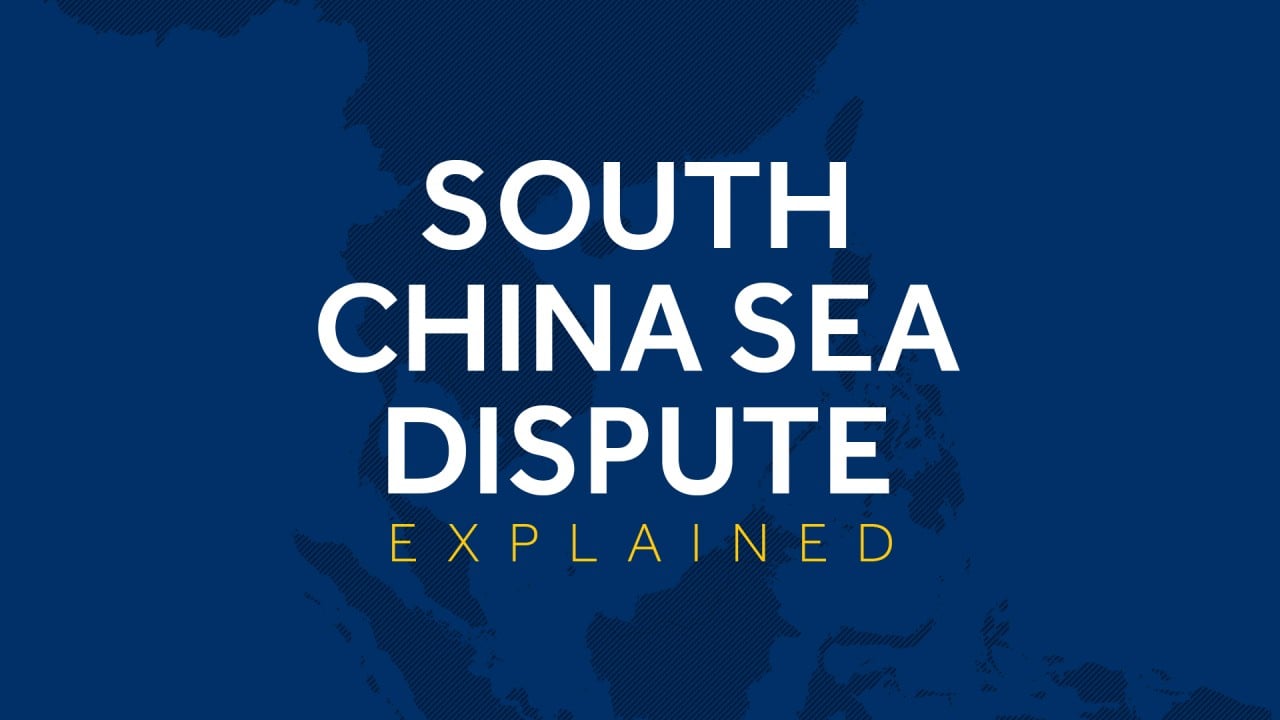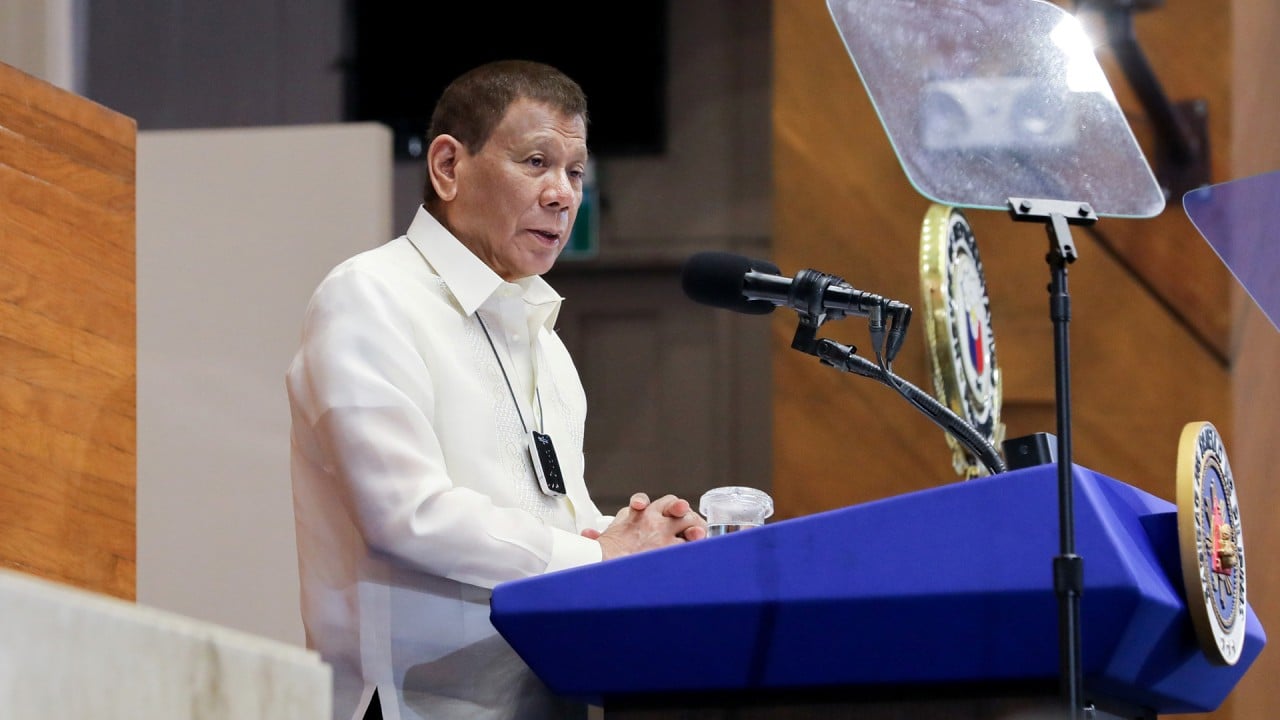
02:32
Washington’s hardened position on Beijing’s claims in South China Sea heightens US-China tensions

China has been scrambling to shore up relations with its Southeast Asian neighbours in recent weeks, with pledges of broad Covid-19 recovery aid and economic cooperation specifically targeted at Washington-friendly countries in a bid to prevent them jumping on the US bandwagon.
As the across-the-board rivalry between the China and the US accelerates towards a fully fledged confrontation, Beijing is ramping up the pressure on neighbouring countries to pre-empt the emergence of a hostile coalition near its doorstep.
Shortly after US Secretary of State Mike Pompeo slammed China over its expansive claims to the South China Sea two weeks ago, Foreign Minister Wang Yi moved to placate Vietnam and the Philippines – the most vocal of the rival claimants in the maritime dispute – while President Xi Jinping spoke to leaders in Thailand and Singapore by phone.
While Thailand and the Philippines are Washington’s treaty allies and Singapore has long been a trusted security partner of the US, Vietnam – China’s steadfast rival in the region – has continued to pivot towards the US in the bitter territorial dispute.
As a result, these countries and other members of the Association of Southeast Asian Nations are increasingly torn between Beijing and Washington, with their long-tested balancing strategy under its biggest stress test amid the growing risks of an outright confrontation.
“It’s true that, going forward, the Asean countries will find themselves in an increasingly precarious – and awkward perhaps – position that may compel them to choose sides,” said Collin Koh, a research fellow from the S. Rajaratnam School of International Studies at Singapore’s Nanyang Technological University.
The US and Chinese navies conducted competing drills in the region earlier this month, with two US aircraft carriers from its Pacific fleet deployed in the South China Sea, in one of the biggest displays of American naval power in years.
Pompeo’s unusually strong statement represented a dangerous shift in Washington’s policy on the maritime dispute, according to Zhu Feng, executive director of the China Centre for Collaborative Studies of the South China Sea at Nanjing University.

02:32
Washington’s hardened position on Beijing’s claims in South China Sea heightens US-China tensions
Apart from lending unequivocal support to China’s rival claimants in the maritime dispute – which include Vietnam, the Philippines, Brunei, Malaysia and Taiwan – it was also part of US President Donald Trump’s upgraded containment strategy towards China ahead of the US elections in November.
“The US is willing to adopt a more confrontational approach amid risks of armed conflict, get directly involved in the South China Sea dispute and expand its presence with its military prowess,” Zhu said.
During his talks with his counterparts from Vietnam and the Philippines, Wang lashed out at the perceived US sabre-rattling, which China views as meddling in an already tense situation in the region.
During an hours-long virtual meeting with Vietnam’s Pham Binh Minh, who also serves as a deputy prime minister, Wang said the US “fanned the flames” everywhere and was forcing countries to take sides. “Its aim is to stir up tension and turmoil in the region.”
Xi also made a subtle point about not taking sides in his conversation with Singapore’s newly-reelected Prime Minister Lee Hsien Loong, one day after Pompeo’s remarks, saying China would work with Singapore to “overcome distractions” to “safeguard regional security”.
Beijing also unveiled a free-trade agreement with its closest regional ally Cambodia, a key counterweight to Vietnam, in a largely symbolic move to highlight China’s formidable economic influence in Southeast Asia.
But observers say it is unclear how far Beijing’s crisis management efforts can bring regional countries into line behind its increasingly assertive international image, despite public remarks and statements aimed at brushing deep-seated distrust and differences under the carpet.
One day after the foreign ministers’ meeting with China, Vietnam signed a memorandum of understanding with the US in which Washington vowed to help Hanoi fight the “illegal intimidation” confronting its fishermen at sea.
While many Asean members are looking to the US for a security partnership, China has been the bloc’s largest trading partner for the past decade. The interdependence between China and Asean countries has been further deepened through the Belt and Road Initiative, Xi’s signature foreign policy and investment strategy.
In the first six months of this year, Asean has overtaken the European Union to become China’s top trading partner. “If anything, the pandemic didn’t reduce Asean countries’ continued view of China as an important trade partner, even if some are seeking to draw foreign investors relocating from China due to the contagion,” Koh said.
Xu Liping, from the Institute of Asia-Pacific Studies at the Chinese Academy of Social Sciences, said it had become increasingly difficult for Asean to build a consensus on how to cope with the shifting balance of power between China and the US.
“The Asean countries have complicated views about the US intervention and the intensifying China-US wrangling,” he said.
From Beijing’s perspective, most of the Asean members which are non-claimants in the South China Sea – including Singapore, Indonesia, Thailand, Myanmar, Laos and Cambodia – are more concerned about how the deterioration of US-China ties could damage their triangular balancing act with the two powers.
On the other hand, China’s rival claimants may somehow benefit from the US-China rivalry in the South China Sea, with Malaysia and Brunei more likely than Vietnam and the Philippines to stay neutral in any prospective conflict between Beijing and Washington, according to Xu.
“Hanoi and Manila will probably join hands with Washington against Beijing because they have pinned their hopes on US interference to counter China and secure their territorial claims,” he said.
But it may be unrealistic for them to expect to work with the US to box in China, because the US did not have a solid record under Trump in its dealings with allies and partners. “Besides, it is not in the interests of Asean to choose sides between major powers and too much pressure from the US may backfire eventually,” Xu said.
Vietnam, which has been a key target for the Trump administration’s Indo-Pacific strategy, has sparred many times with China – over their bitter history, territorial disputes, fishery and oil exploration – and they have also skirmished in the disputed waters.
However, “Vietnam has to be wary of getting too close to the US because this could lead to entrapment. That is, Vietnam could be pulled into a conflict with China instigated by the US,” said Carlyle Thayer, emeritus professor of politics at the Australian Defence Force Academy.
So far, official responses from Indonesia, Malaysia, the Philippines and Vietnam to Pompeo’s South China Sea statement have largely avoided calling out China, while stressing the importance of international law and the 1982 UN Convention on the Law of the Sea.
Even Vietnam – which is considering an international lawsuit against Chinese claims similar to the successful case by the Philippines in 2016 – moderated its stance at last month’s Asean summit. Vietnamese Prime Minister Nguyen Xuan Phuc, the bloc’s current chair, said its members would prefer not to take sides because both powers were considered key partners of the region.

03:23
The South China Sea dispute explained
Brunei, long considered a “silent claimant” in the South China Sea dispute, issued a similarly mild statement this week, which aimed to strike a delicate balance between its territorial claims and its economic dependence on China.
The only exception to the strategy was perhaps the Philippines, said Koh, which gave a more robust response to the Pompeo declaration by renewing its call for China to comply with the 2016 arbitration which ruled Chinese claims over most of the South China Sea were invalid.
This was despite an increasing reliance on Chinese investment under President Rodrigo Duterte’s administration and was walked back in subsequent statements by the Philippines.

03:09
Duterte tells Philippines he asked China for coronavirus vaccine, diplomacy in maritime dispute
In a bid to appease Beijing, Foreign Affairs Secretary Teodoro Locsin said on Wednesday that Manila would not raise the maritime dispute or its 2016 victory at the September meeting of the UN General Assembly. Duterte said on Monday that he had personally asked Xi to help his country with a Covid-19 vaccine once it was available.
“This reflects the caution among Asean parties in what they see as intensifying Sino-US rivalry in Southeast Asia and they again seek the tried-and-tested ways to attempt to navigate their way out of the potential geopolitical minefield,” Koh said.
Koh said that, while it was true that at least some Asean governments may be secretly – if not publicly – rejoicing at the tougher stance taken by the US against China, they essentially viewed it purely in terms of China-US rivalry.